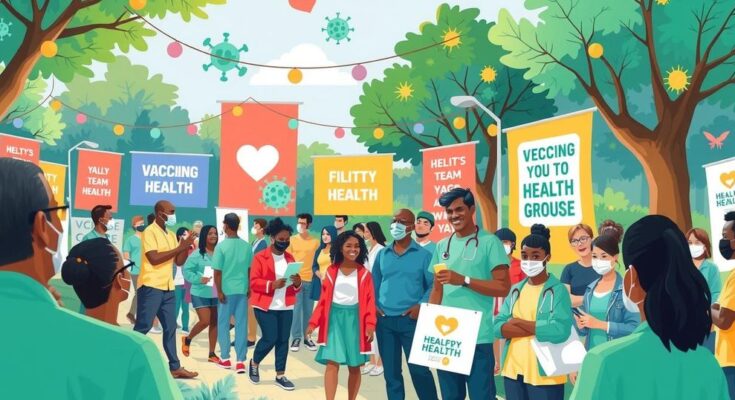Uruguay’s Health Ministry has launched a 2025 vaccination campaign targeting influenza, measles, and RSV, aiming to protect vulnerable groups before peak seasons. The initiative emphasizes the need for high vaccination coverage to prevent disease reintroduction and utilizes scientific evidence for maternal health. Efforts include improving accessibility and combating vaccine misinformation while underscoring the cost-effectiveness of vaccination.
The Public Health Ministry of Uruguay (MSP) initiated its 2025 vaccination campaign, aimed at combatting influenza, measles, and respiratory syncytial virus (RSV) as part of an effort to address both seasonal and emerging health threats, as announced in Montevideo.
The influenza vaccination campaign will commence later this month, focusing on protecting vulnerable populations, such as the elderly, young children, individuals with chronic illnesses, and healthcare professionals, prior to the peak winter season. The annual update to the flu vaccine aligns with circulating strains to bolster community immunity and mitigate severe health outcomes.
Moreover, the MSP is encouraging the public to adhere to the measles vaccination schedule, particularly among children over 15 months, healthcare workers, and travelers destined for countries experiencing outbreaks, such as Argentina, Mexico, and Canada. This effort seeks to avert the reintroduction of measles in Uruguay, a disease eliminated in the region since 2016, by achieving a vaccination coverage rate of 95% or higher.
The campaign also highlights RSV vaccination for pregnant women between 32 and 36 weeks of gestation to safeguard newborns from severe respiratory diseases, thereby lessening the burden on hospitals during viral peak seasons. This initiative, operational since 2023, reflects the MSP’s commitment to maternal and child health, shaped by recent scientific findings.
To enhance vaccine access and oversight, the MSP will tour Departmental Health Directorates, commencing in Canelones. This undertaking is crucial for improving healthcare services and logistics management. Furthermore, the campaign emphasizes the importance of vaccines in disease prevention, economic efficiency, health equity, and countering misinformation, thereby reinforcing the MSP’s educational and management role in public health.
The influenza vaccine is particularly vital in minimizing risks of infection, hospitalization, and mortality among at-risk individuals, including the elderly and those with compromised immune systems. By curbing virus proliferation, it strengthens collective immunity, providing indirect protection for individuals unable to receive vaccinations. The expected deployment in March-April prepares for the southern hemisphere’s winter peak.
Additionally, the MSP cautioned about the contagious nature of measles and its serious complications, such as pneumonia and encephalitis, advocating for the administration of the second vaccination dose. Despite being declared measles-free in the Americas in 2016, recent outbreaks necessitate maintaining high immunization rates.
The RSV vaccine, administered to pregnant women, facilitates the transfer of antibodies to the fetus, significantly lowering the risk of hospitalization due to RSV in infants during their early months. RSV remains a leading cause of serious respiratory issues in infants, necessitating supplementary measures like monoclonal antibody treatment for premature infants.
Uruguayan health authorities reiterated the critical role of vaccines with historical precedents, citing the eradication of smallpox in 1980 and the dramatic decrease in polio cases globally. They underscored the financial benefits of vaccination, which reduces treatment costs and hospital admissions, thereby alleviating strain on healthcare systems. Health officials also advocated against myths and misinformation regarding vaccines, firmly asserting their long-established safety and efficacy supported by extensive scientific research.
The launch of Uruguay’s 2025 vaccination campaign is a significant initiative to enhance public health and fight preventable diseases such as influenza, measles, and RSV. Through this effort, the MSP aims to protect vulnerable populations, maintain herd immunity, and address potential health challenges effectively. The emphasis on high vaccination coverage is essential to prevent the resurgence of diseases and ensure national well-being. Continued education and awareness efforts against misinformation will further support these public health goals.
Original Source: en.mercopress.com




